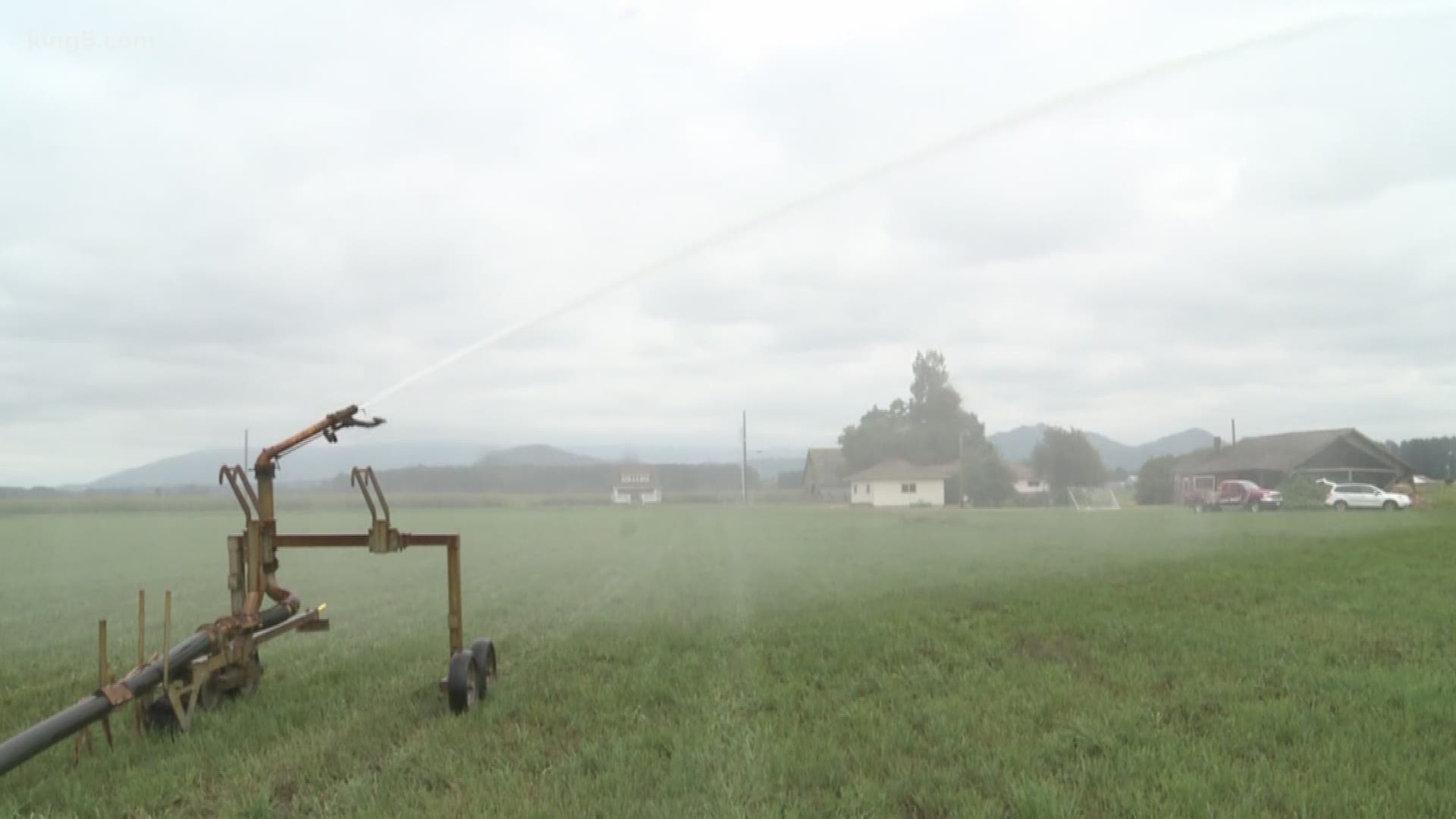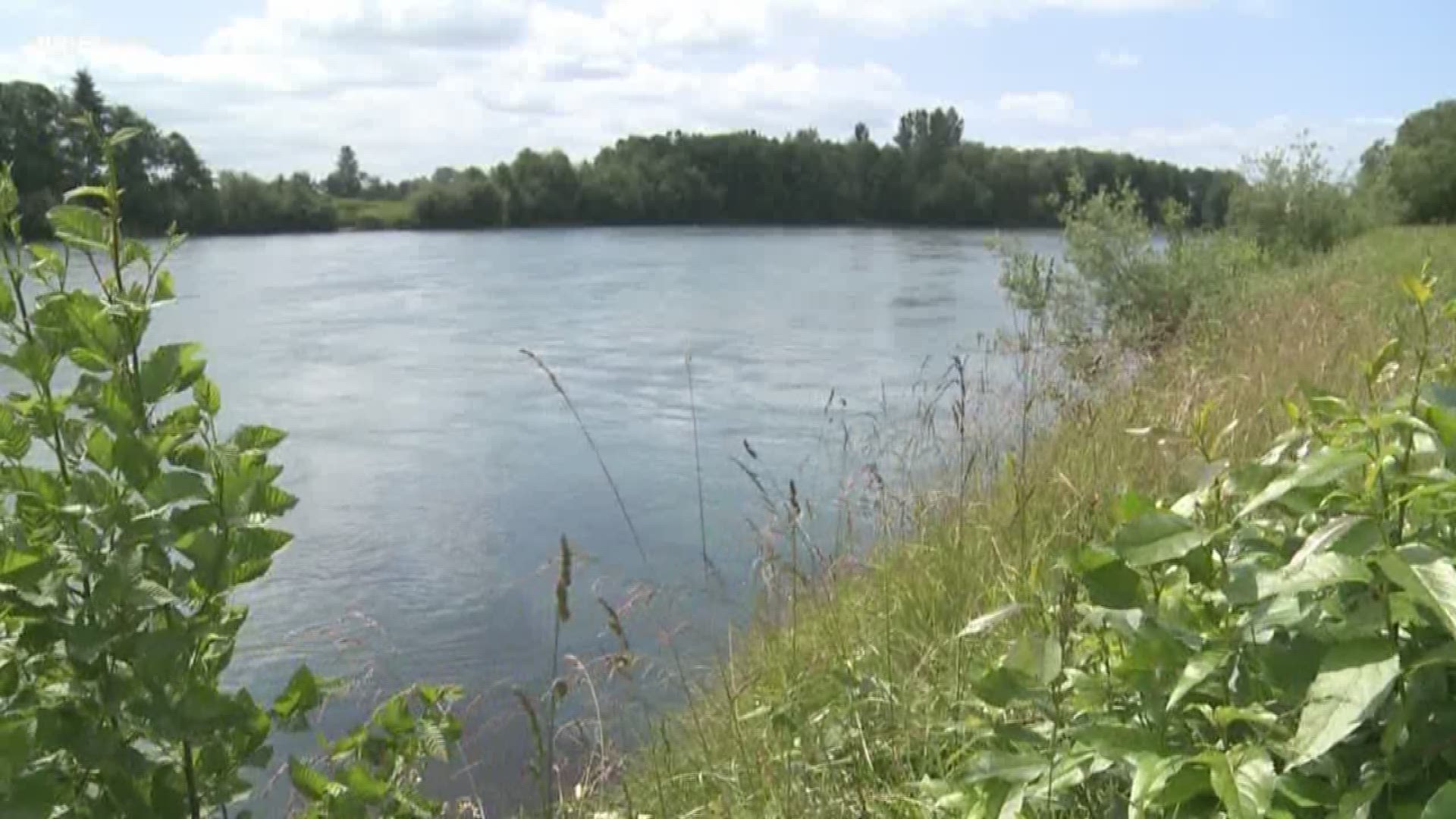MT VERNON, Washington — Farming has never been an easy job, but with drier summers and more protections for endangered salmon, it's increasingly complicated.
In June, KING 5 spoke with Jason VanderKooy at his farm in Mount Vernon, where irrigation guns were shut off. VanderKooy and other farmers depend on taking water from the Skagit River, which also happens to be a river that's important habitat for Chinook salmon.
"From the get go, the river flows have been pretty low. Lower than normal. So we have been struggling to meet in the stream flows over 10,000 CFS and for quite some time, we have been below that, so irrigation suffers because we are not allowed to pump," VanderKooy said. "We were at the point where we had to get something done. It was either watch the grass dry up for me, or try to get some emergency water."
As rivers like the Skagit are challenged by drier summers, and restrictions set into protect fish, farmers are finding themselves with tenuous growing seasons.
"Traditionally, agriculture in Skagit County did not go after a whole lot of Water Rights because they didn’t need a whole lot of water historically, but through climate change, changes in our climate, we have seen temperatures rising over time. Now there is a greater need, and with that, our crops have changed as well," said WSU Skagit County Extension Faculty Member Don McMoran. "Every year we have a Skagit agriculture summit and water is the number one topic."
Water rights are complicated in Washington state and work in order of seniority. Those more junior members are forced to shut off pumps when restrictions begin. To return water to VanderKooy's farm, along with about 10 others, Skagit PUD enacted an emergency water right's transfer to the farmers which was approved by the Washington Department of Fish & Wildlife.
The transfers are allowed between Aug. 10 and Aug. 31 for Skagit County Drainage & Irrigation Improvement District (DIID) #15 and Skagit County Consolidated Diking Improvement District (CDID) #22.
It saved about 1,000 acres of farmland.
"Skagit PUD’s ability to temporarily transfer water rights during emergency conditions is dependent on our own water needs and the availability of water resources through snowpack melt, the amount of spring rainfall and the instream flows of the Skagit River. However, as our service population continues to grow, the possibility of performing this kind of transfer will diminish over time," explained Skagit PUD General Manager George Sidhu. "The agricultural industry is crucial to the economic vitality of Skagit County and Skagit PUD is committed to keeping an open dialogue going with the community to keep the industry viable. The broader issue of securing long term water rights for the industry is something that needs to happen at the state level, and I encourage the farmers to continue those conversations."
There are restrictions on the pumping. It can only occur for a maximum of 3 hours prior to each high tide event and a maximum of 3 hours following each high tide event. In total, that's about 12 hours per day based on two high tide cycles.
Both districts are also required to meter their pumping and submit pumping records daily so that Skagit PUD can keep track of the volumes that were pumped.
"Ecology is very pleased that the parties in the Skagit Valley were able to develop this solution. Because it involves water rights, they needed our review and approval, and we were able to provide that to them the day after they negotiated their agreement. The Skagit Watershed is covered under the Governor’s drought declaration, which enables us to process emergency water right transfers very quickly. We encouraged the parties to problem-solve together and were glad to add our support," said Washington Department of Ecology Spokesman Larry Altose.
VanderKooy is relieved the community worked to find a solution, even as he and others are looking to bigger picture solutions.
"What we have seen the last week or two with this emergency water rights transfer, is that we see several groups working together to solve this problem," VanderKooy said.
See more environmental stories from KING 5's Alison Morrow



